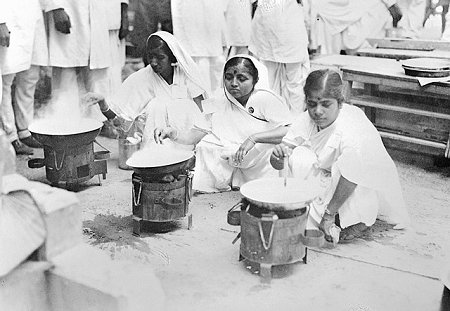Story of Satyagraha
by Jyotsna Kamat
First Online: April 04, 2005
Page Last Updated: December 07, 2024
Gandhiji felt that laws which were totally against the welfare of the people, could be fought peacefully by organizing mass-protests in a civil way.
Pacifism, civil disobedience, rightful resistance against wrong policies, passive resistance, non cooperation are some of the forms of non violence Gandhiji brought into practice. All these terms come under the common term "Satyagraha".
In his autobiography, The Story of My Experiments With Truth Gandhiji has stated that the word "passive resistance" which was in vogue, then in Europe, was "too narrowly" construed. It could be interpreted as a weapon of the weak. It could be characterized by hatred. It could finally manifest itself as violence. A new word had to be coined-based entirely on the ideology of non violence as Gandhiji termed conceived.
Through his periodical," Indian Opinion", Gandhiji announced a nominal prize to the person who could suggest an apt word. The word suggested was Sadagraha (sud-truth; agraha-firmness) in order to make it clearer, Gandhiji changed the word Sad to Satya. "Satyagraha", designated the struggle, he was planning to launch.
Gandhiji was fully aware of the harm involved in Civil Disobedience launched before without preparations. Before starting it, there was need for willing and respectful obedience to the Laws of the LAnd. Laws in general were obeyed out of fear of the penalty for the breach. He quotes an instance. An honest, respectable man will not suddenly take to stealing, whether there is a law against stealing or not, but this very man will not fear any remorse for failure to observe the rule about carrying head lights on the bicycles after dark. "Indeed it is doubtful whether he would even accept advice kindly about being more careful in this respect. But he would observe any obligatory rule of this kind, only to escape the inconvenience of facing a prosecution for a breach of the rule", Gandhiji writes.
Corbis-Bettmann

Citizens Breaking Law in a Peaceful Way in Civil-Disobedience
Satyagraha or struggle against injustice could be individualistic or on a mass scale. He felt that a Satyagrahi (Individual Struggler or soldier of non-violence) had to obey the laws of the society intelligently, and of his own free will. For mass civil disobedience it was necessary to create a band of well tried, pure hearted volunteers who thoroughly understood the strict conditions of Satyagraha.
Patience and sleepless vigilance were required for the same. At the same time Gandhiji became aware of the difficulties in organizing devoted volunteers, in a continued struggle.
![]()

